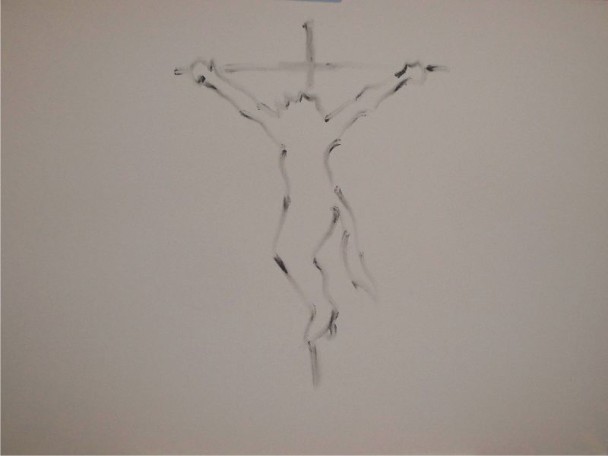
The ashes that we place on our foreheads this evening are ashes that remind us of something. It’s a solemn reminder of the reality of our grave situation. That is, we are mortal. It’s not just the sense that we will die like everyone else. We enter into this season of Lent to be reminded of the fact that we do not have the say over this life.
The Psalm of Moses, Psalm 90 says, For all our days pass away under your wrath; we bring our years to an end like a sigh. The years of our life are seventy, or even by reason of strength eighty; yet their span[c] is but toil and trouble; they are soon gone, and we fly away. Who considers the power of your anger, and your wrath according to the fear of you? So teach us to number our days that we may get a heart of wisdom.
We are called to number our days. Be reminded of what our misgiving, our sin, has done to this world. It has brought death, the wrath of God. There is no way out.
(Begin drawing body of Christ)
That is why The Father saw it in His infinite mercy to sent His Son to be under the wrath of God. He sent His Son to take on this mortal flesh. He came to take on these bodies that return to dust. He took it on so that He might die in our place. He took our death upon himself and died the death that we deserve.
This is why the ashes that we receive on our heads this evening are not just some spot or dab of ashes with no particular shape. No, these ashes are in the shape of a cross. They remind us of the fact that Christ has taken this death in our place.
So we need seasons of the church year like Lent, as much as we need to be reminded of the fact that we are totally dependent on our Lord’s mercy and grace that He gives to us in His Son, Jesus. The one who took on our mortal flesh, placed himself under God’s wrath though He knew not sin, and now promises us life with Him through what we see at the end of this season of Lent on Easter morning. Christ bore our mortality under the Law of God in our place even though he did not have any sin, he bore our iniquities.
But until then, we recall it all as we enter into these six long weeks. But really as Jesus speaks in the Sermon on the Mount, Jesus assumes that His followers will fast, He assumes that His disciples will take moments like Lent, but not just Lent at many and all times of the year to reflect upon their sin, repent, and recall the promise of Christ. He assumes that they will take these moments to reflect on the severity of sin and the brokenness of creation.
That is why our text in Matthew this evening is not about if you take moments like this reflection but what you do when you do it. The difference between His follower and anyone else who can see how terribly messed up this world is, is that for you, you know the grace of God in Jesus. You have no need to show off your reflection on the gravity of the world in an attempt to look sincere. This is no moment for pride. It’s not a time to go to public places and flaunt that we went to church tonight by the symbols on our heads. No, to all of that. You have the grace of God and have no need for any of it. You have no need for the rewards of getting respect and reverence now. “Your Father in Heaven who sees in secret will reward you.”
Reflecting on our mortality can be a good thing. Dare I say it, a necessary thing. But if it doesn’t point you to Jesus then it isn’t worth a hill of beans. So this Ash Wednesday. Look to Jesus, the One who bore your mortality. The One who Bore your iniquities on the cross. And as you wash the ashes that symbolize your sin off this evening, be reminded of your Baptism where you died with Christ and are given new life and forgiveness in Him. Go in His peace.





